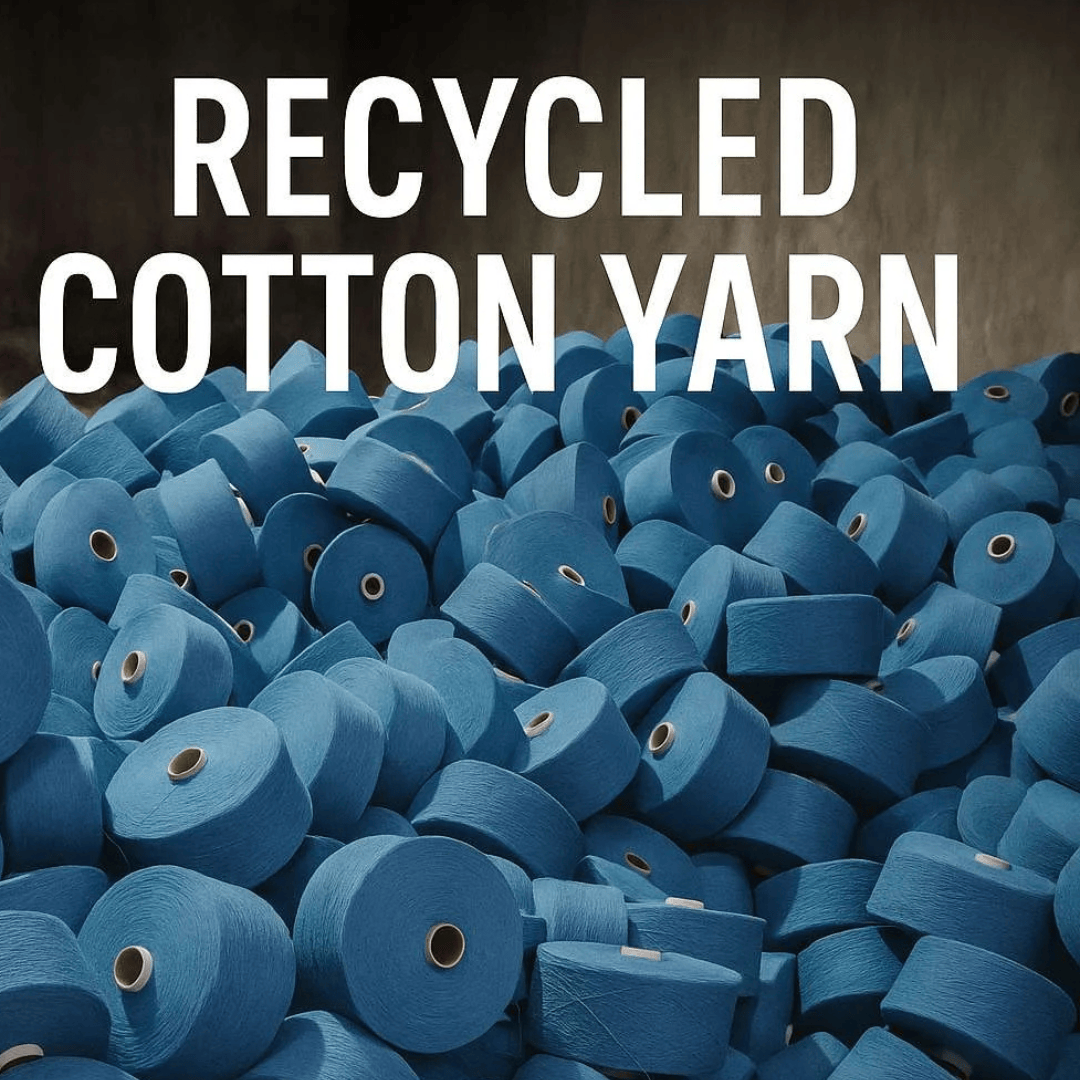Denim is a symbol of durability, style, and everyday wear. But behind every pair of jeans lies an intense manufacturing process — one that uses vast amounts of water, energy, and raw cotton. As sustainability becomes a driving force in the textile industry, a key question arises: Can recycled cotton yarn replace virgin cotton in durable fabrics like denim?
In 2025, with increasing demand for eco-conscious clothing, recycled cotton yarn has emerged as a promising solution. But can it truly match the strength, feel, and performance of conventional yarn in heavy-duty applications like denim?
Let’s explore the facts, challenges, and potential of recycled cotton yarn in the world of rugged fashion.
Understanding Recycled Cotton Yarn
Recycled cotton yarn is created by reprocessing pre-consumer waste (such as cuttings from garment factories) or post-consumer waste (like discarded clothing). These scraps are shredded, cleaned, and re-spun into new yarns, reducing the need for virgin cotton cultivation.
Leading recycled cotton yarn manufacturers today offer blends tailored to meet specific textile requirements—ranging from soft knits to thick, resilient woven fabrics like denim.
Why Denim Is a Challenge
Denim isn’t your average fabric. It’s:
-
Heavily woven: Usually twill weave, making it dense and structured
-
Washed, dyed, and distressed: Adds stress during processing
-
Expected to last: Jeans must withstand frequent wear, washing, and abrasion
That means the yarn used in denim must possess high tensile strength, stretch recovery, and surface uniformity. Traditionally, only long-staple virgin cotton was believed to meet these standards. But that belief is rapidly being challenged.
Can Recycled Cotton Yarn Be Used in Denim?
Yes, and it’s already happening. Recycled cotton yarn has proven it can be used in denim — especially when blended with other fibers and produced by experienced recycled cotton yarn suppliers using advanced processes.
Let’s break down how it performs:
✅ 1. Tensile Strength
One concern with recycled cotton yarn is shorter fiber length due to mechanical shredding. Short fibers can reduce yarn strength. However, modern spinning technologies such as open-end (OE) spinning and rotor spinning now allow manufacturers to produce stronger, more uniform yarns, even from recycled fibers.
Many denim manufacturers now use blends like 60% recycled cotton + 40% polyester or virgin cotton, which significantly improve tensile strength while retaining sustainability benefits.
✅ 2. Durability & Wash Performance
Top recycled cotton yarn manufacturer have introduced core-spun yarns, where a strong filament core is wrapped with recycled cotton fibers. These are particularly suited for heavy-duty applications like denim and workwear, as they resist breakage and abrasion during harsh washing.
Brands using recycled yarn-based denim have reported good results in stone washing, sandblasting, and enzyme washes—processes that would typically wear out weaker yarns.
✅ 3. Comfort and Hand Feel
While recycled cotton yarns may lack the silky smoothness of virgin extra-long staple cotton, they provide an authentic, rugged texture that aligns well with denim aesthetics. When processed correctly, the hand feel is comfortable, breathable, and skin-friendly — especially for 100% recycled cotton or recycled blends.
In fact, many fashion brands highlight the “slub” or natural variation in texture as a desirable sustainable design element.
✅ 4. Dye Absorption & Aesthetic Performance
Indigo dyeing is central to denim’s identity. Recycled cotton yarn, especially when undyed or lightly processed, readily absorbs indigo dye and holds color well when pre-treated properly. Many recycled yarn suppliers offer pre-dyed or indigo-ready yarns, making the transition seamless for denim manufacturers.
Real-Life Examples of Recycled Cotton Yarn in Denim
🟩 Levi’s “Wellthread” Line
Levi’s uses up to 40% recycled cotton in its Wellthread denim range, combining sustainability with performance.
🟩 Mud Jeans (Netherlands)
Their jeans are made from up to 40% post-consumer recycled denim, spun into new yarn and woven into strong, durable fabric.
🟩 Indian Recycled Yarn Suppliers & Exporters
Many manufacturers from Panipat, Tiruppur, and Gujarat now supply recycled cotton yarn suitable for denim, with global certifications like GRS and OEKO-TEX®.
These examples show that recycled cotton yarn is not only viable for denim — it’s already on shelves.
The Role of Blends in Enhancing Performance
For brands seeking both performance and sustainability, blends are the go-to solution. Common combinations include:
-
Recycled cotton + virgin cotton
-
Recycled cotton + recycled polyester (rPET)
-
Recycled cotton + elastane for stretch denim
These blends balance strength, stretch, and softness, making them ideal for denim, jackets, dungarees, and even heavy-duty bags.
What to Look for in Recycled Cotton Yarn Suppliers
When sourcing yarn for denim production, here’s what to check:
-
✅ Fiber Blend Ratios: Look for blends tested for heavy-duty use.
-
✅ Tensile Strength Data: Ask for lab test reports or product samples.
-
✅ Color Options: Some suppliers offer pre-colored yarns, saving dyeing resources.
-
✅ Certifications: GRS, OEKO-TEX®, ISO 9001 for quality and sustainability.
-
✅ Customization: Yarn count, twist, and color tailored to your denim specs.
By working with experienced recycled cotton yarn suppliers, denim brands can ensure high-quality, low-impact results.
Advantages Beyond Durability
Aside from handling heavy-duty applications, recycled cotton yarn offers:
-
🌱 Up to 70% reduction in water usage
-
🌱 Lower carbon footprint compared to virgin cotton
-
🌱 Cost-effectiveness at scale
-
🌱 Improved brand image in sustainability-conscious markets
-
🌱 Access to eco labels and B2B sustainability platforms
Conclusion: Recycled Cotton Yarn Can Stand Up to Denim
The myth that recycled cotton yarn is only suitable for basic or low-strength applications is officially outdated. With the right sourcing, fiber blending, and manufacturing process, recycled yarn can absolutely handle denim’s demanding requirements.
In 2025 and beyond, brands that switch to recycled cotton yarn for denim not only reduce environmental impact but also tap into a growing market of consumers who value sustainability without compromise.
Partner with certified recycled cotton yarn suppliers and take your next denim line from rugged to responsible.
